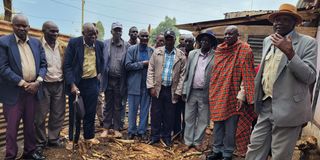Why Sabaot elders have joined the fight against FGM

Sabaot Supreme Council of Elders during a press briefing in Kapsokwony town.
What you need to know:
- Mt Elgon is among the regions considered as female genital mutilation (FGM) hotspots.
- Thousands of girls and women are still in danger of being subjected to the outlawed practice.
In Mount Elgon, a western Kenya region inhabited by the Sabaot community, female genital mutilation (FGM) is still rampant.
Thousands of girls and women are in danger of being subjected to the outlawed practice.
Elders, considered the gatekeepers of the community’s culture, had been accused of supporting the practice. Therefore, their recent decision has been a major boost for the fight against the practice.
The Supreme Council of Sabaot Elders has agreed to partner with the government to end what members now term untold suffering that has hurt the community’s socioeconomic development.
They made the commitment when they paid a courtesy call on Anti-FGM Board CEO Bernadette Loloju, and termed their support crucial.
Ms Loloju lauded them for their brave move, noting that with their commitment, ending FGM would be a reality sooner than anticipated.
“The law itself cannot end FGM. That is why we have been using community dialogues to enlighten the elders on why we need to stop outdated cultural practices," Ms Loloju said.
“We are also working on a roadmap towards a historic declaration by the elders to denounce FGM from their cultural rites and practices.”
Through the Kenya-Finland Bilateral Programme in Prevention and Response to Gender-Based Violence, the two groups have already held a series of anti-FGM meetings in Chepkitale, Cheptais, Kapsokwony and Kopsiro.
Also read: Intense awareness campaign key to ending FGM
Mt Elgon is one of the FGM hotspots. This explains why the board is keen on bringing the elders on board in its campaigns. The elders will now organize and lead forums that sensitise residents to the dangers, types and health complications of FGM; the FGM Act; and sexual and reproductive rights.
They agreed that retrogressive traditions had impeded their economic empowerment, and expressed their resolve to end the practice.
The MenEndFGM, an organisation leading a campaign to lobby stakeholders to prevail upon men to join the fight against FGM, has welcomed the elders’ move.
“Not involving men in the fight against FGM is like a doctor treating the symptoms of a disease and totally ignoring it all together,” said Tony Mwebia, the MenEndFGM founder.
The Ant-FGM Board has been on a charm offensive in all the 22 FGM hotspot counties to woo elders to denounce the mutilation of girls.
The most outstanding commitment came from Samburu elders, who signed a historic declaration in 2021 to end FGM and child Marriage. It was dubbed the Kisima Declaration. Former President Uhuru Kenyatta witnessed the ceremony.
The elders were drawn from the six sacred mountains of Samburu. They lifted a “cultural curse” on girls who have not undergone the cut. The purported curse has been one of the drivers of FGM among the Samburu as girls opt to undergo the cut for social acceptance.
The lifting of the curse now means girls who have not been mutilated are now accepted in the community and can participate in cultural celebrations, activities and other rites from which they were barred.
Also read: FGM is a practice that belongs to old past
Elders from the Maasai, Pokot, Marakwet and Borana communities have also made similar declarations.
Faith Nashipae, the brains behind Nitasimama Imara Boys and Men's Programme, also lauded the move by the elders.
“Men and boys are the biggest perpetrators of gender-based violence, hence the reason we needed to focus on them.
“They had been sidelined in the GBV fight, despite them being one of the most important players, something that has derailed the campaign.
“This is why we need to recognise and involve them to make the world a better place for women and girls,” she told Nation.Africa.
The campaign has not left women behind, as they have also been accused of puncturing efforts to root out the outlawed practice by participating as circumcisers and inciting their sons against marrying girls who have not been mutilated.
The board recently met with over 400 women from the Chepkitale area to create awareness of the adverse effects of FGM and advocate its immediate abandonment.





